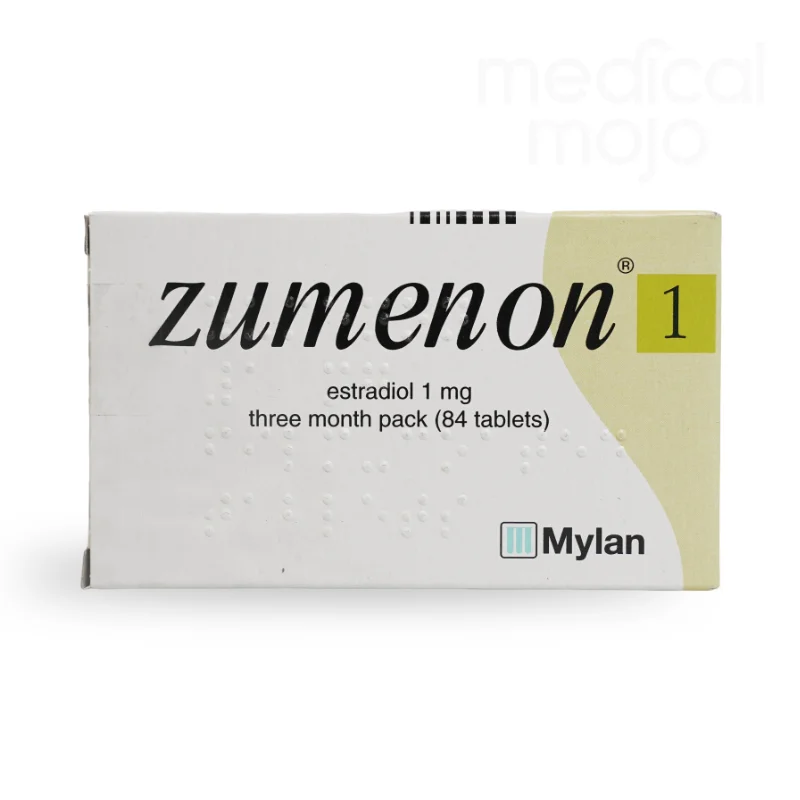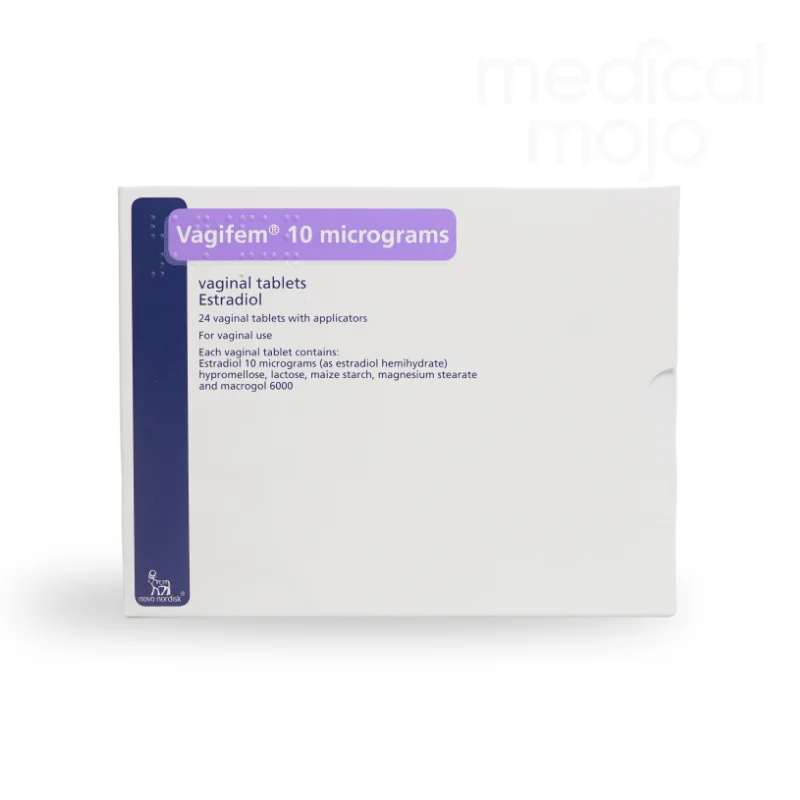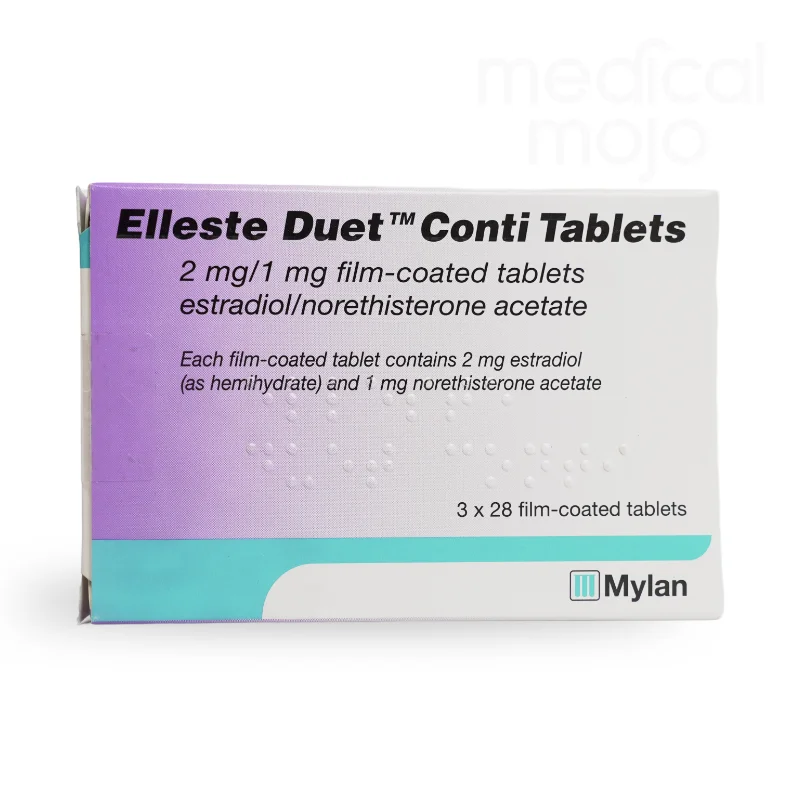What is Zumenon?
Zumenon is a potent Hormone Replacement Therapy (HRT) that features a synthetic form of estrogen known as estradiol. This medication is designed for postmenopausal women, those who have been without a natural period for at least six months, and those transitioning from standard (cyclic or sequential) HRT as directed by their healthcare provider.
During menopause, estrogen levels decline, which can lead to symptoms such as hot flashes, thinning hair, night sweats, and irregular menstrual cycles. Zumenon helps to replenish estrogen levels, providing relief from these uncomfortable symptoms and helping you to manage daily life more effectively.
Available in 1 mg or 2 mg doses, Zumenon is prescribed based on individual needs, with regular reviews to determine the most appropriate strength. To minimize risks such as certain cancers and blood clots associated with HRT, it’s recommended to use the lowest effective dose for the shortest duration necessary.
Manufactured by Mylan, Zumenon tablets come in packs of 84.
What is Zumenon used for?
Zumenon is prescribed for:
- Relief of Menopausal Symptoms: During menopause, the natural production of estrogen in a woman's body significantly decreases, which can lead to troublesome symptoms like hot flashes, night sweats, and discomfort in the face, neck, and chest. Zumenon is used to alleviate these symptoms and improve quality of life post-menopause.
- Management of Severe Symptoms: Zumenon is typically prescribed when menopausal symptoms are severe enough to significantly impact daily activities and overall well-being. It is not used for mild symptoms but rather for those that are disruptive and challenging to manage.
Zumenon works by supplementing the declining estrogen levels, providing relief from the discomfort associated with menopause. Your doctor will only prescribe Zumenon if it is deemed necessary to address significant symptoms that are hindering your daily life.
Who should not use Zumenon?
Understanding Risks and Monitoring:
Using Hormone Replacement Therapy (HRT) like Zumenon involves weighing potential risks. It's crucial to consider these risks before starting or continuing the treatment. If you have experienced premature menopause (due to ovarian failure or surgery), the risks associated with HRT might differ. Please discuss this with your doctor.
Initial Evaluation:
Before starting or restarting Zumenon, your doctor will review your medical history and may inquire about your family’s health background. A physical examination, including possible breast and/or internal exams, may be recommended.
Ongoing Monitoring:
Once you begin taking Zumenon, you should schedule regular check-ups with your doctor at least once a year. These appointments are essential to evaluate the benefits and risks of continued use. Regular breast screenings as advised by your doctor are also recommended.
When Not to Take Zumenon
Do not use Zumenon if any of the following apply to you. Consult your doctor if you are uncertain about any of these conditions:
- History or suspicion of breast cancer.
- Cancer that is sensitive to estrogen, such as endometrial cancer.
- Unexplained vaginal bleeding.
- Untreated excessive thickening of the womb lining (endometrial hyperplasia).
- History of blood clots in veins (e.g., deep vein thrombosis or pulmonary embolism).
- Blood clotting disorders (e.g., protein C, protein S, or antithrombin deficiency).
- Recent or past arterial blood clot-related diseases (e.g., heart attack, stroke, angina).
- Liver disease with abnormal liver function tests.
- Hereditary blood condition called porphyria.
- Allergy to estradiol or any other ingredient in Zumenon.
If any of these conditions arise while taking Zumenon, discontinue use and consult your doctor immediately.
When to Exercise Caution
Inform your doctor if you have had or have any of the following conditions, as they may need closer monitoring during treatment with Zumenon:
- Uterine fibroids.
- Endometriosis or history of excessive growth of the womb lining.
- Increased risk of blood clots.
- Family history of estrogen-sensitive cancers (e.g., breast cancer).
- High blood pressure.
- Liver disorders, including benign liver tumors.
- Diabetes.
- Gallstones.
- Migraine or severe headaches.
- Autoimmune disorders (e.g., systemic lupus erythematosus).
- Epilepsy.
- Asthma.
- Hearing problems related to the eardrum (otosclerosis).
- High blood fat levels (triglycerides).
- Fluid retention due to cardiac or kidney issues.
- Hereditary or acquired angioedema.
Immediate Action Required:
If you experience any of the following while on HRT, stop taking Zumenon and seek medical attention immediately:
- Any conditions listed in the "Do Not Take Zumenon" section.
- Yellowing of the skin or eyes (jaundice), indicating possible liver issues.
- Swelling of the face, tongue, or throat, or difficulty swallowing, possibly indicating angioedema.
- A significant increase in blood pressure (symptoms may include headache, tiredness, dizziness).
- New or worsening migraine-like headaches.
- Signs of pregnancy.
- Symptoms of a blood clot, such as:
- Painful swelling and redness in the legs.
- Sudden chest pain.
- Difficulty breathing.
For more information, refer to the section on "Blood Clots in a Vein (Thrombosis)."
Note: Zumenon is not a contraceptive. If you are under 50 or it's been less than 12 months since your last menstrual period, additional contraception may be necessary. Consult your doctor for guidance.
HRT and Cancer Risks
Endometrial Cancer:
Using estrogen-only HRT like Zumenon can increase the risk of excessive thickening of the womb lining (endometrial hyperplasia) and endometrial cancer. Adding a progestogen to your regimen can mitigate this risk if you still have your womb. If you’ve had a hysterectomy, discuss with your doctor whether you can safely use Zumenon without a progestogen.
Unexpected Bleeding:
You may experience monthly bleeding (withdrawal bleed) while on Zumenon. If you have unexpected bleeding or spotting that persists beyond the first 6 months, begins after 6 months of use, or continues after stopping Zumenon, consult your doctor promptly.
Breast Cancer:
Evidence indicates that both combined estrogen-progestogen and estrogen-only HRT can increase the risk of breast cancer. The additional risk becomes noticeable within 3 years of use and may persist for up to 10 years or more after discontinuation, especially if used for over 5 years.
Ovarian Cancer:
Ovarian cancer risk is slightly increased with HRT use, though it is much rarer than breast cancer. For women aged 50-54 not taking HRT, about 2 in 2000 will be diagnosed with ovarian cancer over 5 years. This number increases slightly with 5 years of HRT use.
Cardiovascular Effects
Blood Clots:
HRT use can increase the risk of blood clots in veins, especially in the first year. This risk is elevated with age and certain conditions. Symptoms of a blood clot include pain and swelling in the legs, sudden chest pain, and difficulty breathing. For more details, see "Blood Clots in a Vein (Thrombosis)."
Heart Disease:
There is no evidence that HRT prevents heart attacks. Women over 60 using combined estrogen-progestogen HRT may have a slightly higher risk of heart disease.
Stroke:
HRT use is associated with a 1.5-fold increase in stroke risk. For women in their 50s not using HRT, the average stroke incidence is 8 in 1000 over 5 years, which increases to 11 in 1000 with HRT use (an extra 3 cases).
Other Conditions:
HRT does not prevent memory loss, and there is some evidence suggesting a higher risk of memory issues if HRT is started after age 65.
Laboratory Tests
If you need blood tests, inform the medical staff that you are using Zumenon, as it may affect some test results.
Pregnancy and Breast-feeding
Zumenon is intended for use in peri and postmenopausal women only. If you become pregnant, discontinue Zumenon and consult your doctor immediately.
Lactose Intolerance
Zumenon tablets contain lactose. If you have been advised by your doctor that you have a sugar intolerance, consult your doctor before taking this medication.
Does Zumenon interact with other medicines?
Certain medicines can affect the efficacy of Zumenon or lead to irregular bleeding. These include:
- Epilepsy medications (e.g., phenobarbital, phenytoin, carbamazepine).
- Tuberculosis treatments (e.g., rifampicin, rifabutin).
- HIV medications (e.g., nevirapine, efavirenz).
- Herbal remedies like St John’s Wort.
Conversely, Zumenon may affect how other medications work, such as:
- Epilepsy drug lamotrigine, which could increase seizure frequency.
- Hepatitis C medications, potentially affecting liver enzyme levels.
Notify your doctor or pharmacist about any other medications, including over-the-counter and herbal products, before starting Zumenon.











